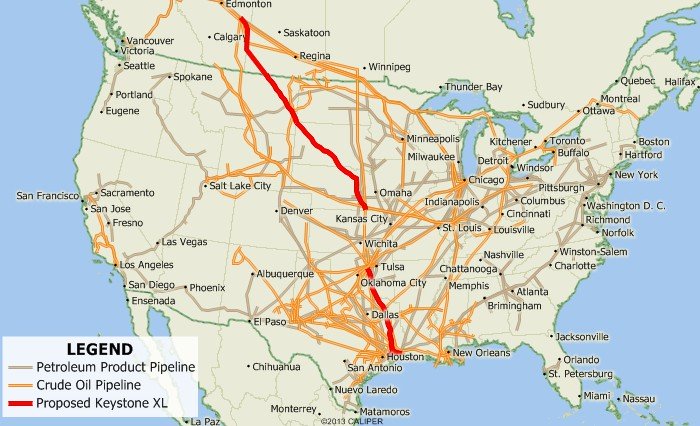That, I would say, is up to Canada. How it is transported makes little difference to me other than I don't want that pipeline on US soil.
But that is just it. The oil is coming by rail now. And it puts much more carbon in the air then pumping it through a pipe. I would rather they follow the existing pipeline although it is farther and would cost more as well as higher pumping costs.
Cushing is a major storage hub, the pipeline between it and Houston can be
The bottom red section began operation in 2014. Canada already sends 550,000 barrels of oil per day to the US via the existing Keystone pipeline.
Crude oil by rail.
A complete database for all rail roads, 400 rail loading and unloading terminals in North America with onweships, capacities and more. Request GIS demo today

rextag.com
Which Is Safer For Transporting Crude Oil: Rail, Truck, Pipeline Or Boat?
Canada’s energy regulator announced in June 2018 that
200,000 barrels per day is being exported by rail. So which mode is safer? For oil, the short answer is: truck worse than train worse than pipeline worse than boat (
Oilprice.com). "
"Every crude oil has different properties, such as sulfur content (sweet to sour) or density (light to heavy), and requires a specific chemical processing
facility to handle it. Different crudes produce different amounts and types of products, sometimes leading to a glut in one or more of them, like too much natural gas liquids that drops their price dramatically, or not enough heating oil that raises their price.
As an example, the second largest refinery in the United States, Marathon Oil’s GaryVille Louisiana facility, can handle over 520,000 barrels a day (bpd) of heavy sour crude from places like Mexico and Canada but can’t handle sweet domestic crude from New Mexico.
Thus the reason for the Keystone Pipeline or increased rail transport - to get heavy tar sand crude to refineries in the American Midwest and along the Gulf Coast than can handle it.
The last entirely new petroleum refinery in the United States
opened in 1976. Since then, the number of refineries has steadily declined while refining capacity has concentrated in ever-larger facilities. 25% of U.S. capacity is found in only eleven refineries. Recently, Shell’s Baytown refinery in Texas, the largest in the nation, was expanded to 600,000 bpd. Most of the big refineries can handle heavy crude, but many smaller refineries can process only light to intermediate crude oil, most of which originates within the U.S.
A rail tank car carries about 30,000 gallons (÷ 42 gallons/barrel = about 700 barrels). A train of 100 cars carries about 3 million gallons (70,000 barrels) and takes over 3 days to travel from Alberta to the Gulf Coast, about a million gallons per day. The Keystone will carry about 35 million gallons per day (830,000 barrels). This puts pressure on rail transport to get bigger and bigger, and include more cars per train, the very reason that crude oil train wrecks have dramatically increased lately.
(
https://www.forbes.com/sites/jamesc...-rail-truck-pipeline-or-boat/?sh=4035d3847b23)




